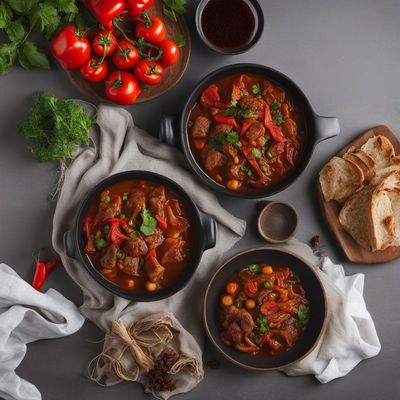
Ingredient
Chickpeas (with pods)
The Versatile Legume: Chickpeas with Pods
Chickpeas with pods are small, round legumes that are encased in a green, slightly fuzzy pod. They have a nutty and earthy flavor, with a tender yet slightly crunchy texture. When cooked, the pods become soft and edible, while the chickpeas inside remain firm and creamy. They are commonly used in stews, curries, salads, and stir-fries.
Origins and history
Chickpeas, also known as garbanzo beans, have a rich history dating back thousands of years. They are believed to have originated in the Middle East and have been cultivated in the Mediterranean region for centuries. Chickpeas have played a significant role in various cuisines, including Indian, Middle Eastern, and Mediterranean, and are often associated with traditional dishes like hummus and falafel.
Nutritional information
Chickpeas with pods are a good source of plant-based protein, dietary fiber, and essential minerals such as iron and magnesium. They are also low in fat and contain no cholesterol. A 1-cup serving of cooked chickpeas with pods provides approximately 270 calories, 14 grams of protein, 45 grams of carbohydrates, and 12 grams of fiber.
Allergens
Chickpeas with pods may cause allergic reactions in individuals with legume allergies. It is important to be cautious and consult with a healthcare professional if you have any known allergies or sensitivities.
How to select
When selecting chickpeas with pods, look for fresh, vibrant green pods that are free from blemishes or discoloration. The pods should feel firm and plump to the touch. Avoid any pods that are wilted or have signs of mold. Additionally, you can gently squeeze the pods to ensure the chickpeas inside are firm and not mushy.
Storage recommendations
To maintain the freshness of chickpeas with pods, store them in a perforated plastic bag or a container with a lid in the refrigerator. They can stay fresh for up to a week. Avoid washing the pods until you are ready to use them, as excess moisture can promote spoilage.
How to produce
Chickpeas with pods can be grown at home by planting chickpea seeds in well-draining soil and providing them with adequate sunlight and water. They can be grown in containers or directly in the ground, making them suitable for both small gardens and larger spaces. With proper care and attention, you can enjoy fresh chickpeas with pods right from your own garden.
Preparation tips
Chickpeas with pods can be boiled, steamed, or stir-fried. To prepare them, remove the pods from the chickpeas by gently squeezing or twisting them. The chickpeas can then be used in various recipes, such as salads, soups, or roasted as a crunchy snack. The pods can be cooked and enjoyed as a side dish or added to stews and curries for added texture and flavor.
Culinary uses
Chickpeas with pods are commonly used in Indian, Middle Eastern, and Mediterranean cuisines. They are often added to curries, stews, salads, and stir-fries for their unique texture and flavor. In Indian cuisine, they are used to make dishes like chole and samosas. In Middle Eastern cuisine, they are a key ingredient in dishes like ful medames and falafel. In Mediterranean cuisine, they are used in salads and as a topping for hummus.
Availability
Chickpeas with pods are commonly available in countries with a strong culinary tradition in Indian, Middle Eastern, and Mediterranean cuisines. They can be found in grocery stores, supermarkets, and farmers markets in regions such as India, the Middle East, North Africa, and the Mediterranean countries.
More ingredients from this category

Asparagus peas (with pods)
The Delicate Delight: Exploring the Unique Asparagus Peas

Garden peas (with pods)
The Green Gems of the Garden

Moringa (with pods)
The Nutritional Powerhouse of Moringa Pods

Pigeon peas (with pods)
Versatile Legume with Edible Pods

Winged pea (young pods)
The Delicate Delight: Exploring the Winged Pea's Young Pods

Chickling vetches (with pods)
The Versatile Legume: Exploring the World of Chickling Vetches
